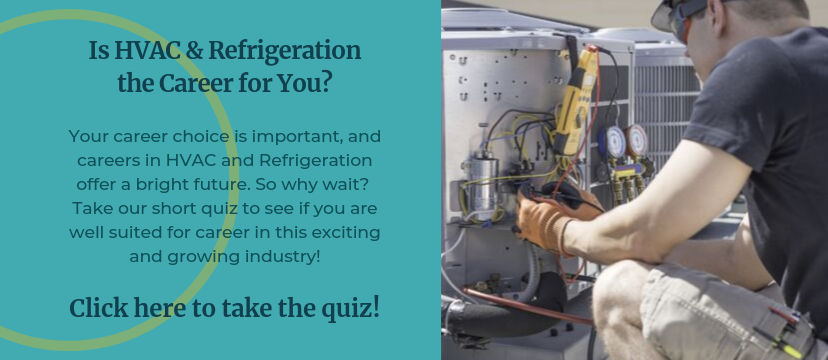If variety is the spice of life, then a career in the HVAC industry is pretty darn “spicy.”
Ask any HVAC service technician and they’ll tell you that every day brings something new: a different customer to work with, a unique problem to solve, and new opportunities to build on their skills and experience.
And in addition to the day-to-day variety of the work, the HVAC career path offers service technicians a diverse range of job opportunities. This blog takes a look at just some of the possibilities.
The basics of the HVAC technician’s job
In general, an HVAC service technician helps to install, maintain, and repair heating and air conditioning systems in residential and commercial properties. Also called an HVAC mechanic or installer, a service technician might also work with ventilation systems or refrigeration (HVACR).
“HVAC is a great career field because it’s always in demand,” according to Nancy Falco, General Manager of the BP Group, a New York-area building services firm that specializes in commercial HVAC solutions. Among her many responsibilities, Nancy handles recruiting for BP Air Conditioning and other divisions of the BP Group.
“For example, people think air conditioning is just needed in the summer, but our AC division is busy year-round,” says Nancy, “Our AC team meets the ongoing cooling needs of everything from computer rooms in office buildings to machine rooms in factories, to MRIs and other equipment in hospitals.”
Projections for growth in HVAC jobs
Another reason why the HVAC career path offers so many opportunities is that the industry is continuing to grow.
According to the U.S. Bureau of Labor Statistics (BLS), employment in the HVAC field will increase 13% for the period from 2018 to 2028. That’s huge compared with the 5% projected growth for all occupations together. (You can find more BLS statistics on HVAC jobs here.)
That growth is due to a number of factors, including:
- The continuous development of new heating and cooling technologies
- The ongoing interest in improving system performance and energy efficiency
- The need to upgrade or replace older and less efficient HVAC equipment
This is great news for people entering the field, as well as those who are already on the HVAC career path: The steady demand for HVAC technicians and related skills also means good job security and competitive wages.
Learn more: NYC HVAC Job Outlook
Starting out on the HVAC career path
Some technicians start out by completing an HVAC program at a trade or technical school, and some start with an entry-level position at an HVAC company.
Besides getting valuable employee benefits when working for an HVAC company, technicians often have opportunities for career advancement within the company. With experience and proven skills, a technician’s HVAC career path often leads to a job as a shop steward, foreman, field service supervisor, or other management position.
For example, at the BP Group, many senior mechanics have made the move to the office — taking on management and customer service roles where their field experience is a big advantage, such as:
- Technical estimator
- Service dispatcher/coordinator
- Project manager
- Training manager
Some people who get started in HVAC might decide field work is not the best fit (or, might need less physically demanding work as they get older). For them, the HVAC career path offers other opportunities in a wide range of important jobs such as:
- Customer service
- Inside sales
- Inventory specialist
- Purchasing
- Safety director
- Truck and shop maintenance
Opportunities outside of HVAC companies
The HVAC career path offers opportunities besides working for an HVAC company. For instance, large organizations such as manufacturing plants, office complexes, medical facilities, research laboratories, universities, and government facilities sometimes have their own in-house HVAC staff.
An HVAC technician can also work in a related business — for example, as an assembler or fabricator at an HVAC manufacturing company. Technicians with a knack for sales on top of their knowledge of how heating and cooling systems work can get a job with an HVAC equipment dealer or distributor.
In addition, some experienced technicians may opt to work as independent contractors or to start their own HVAC businesses. While this path comes with added responsibilities and risks, the rewards can be great for highly motivated, skilled, and independent HVAC technicians.
The chance to specialize in what you like
The HVAC career path also offers areas of specialization within HVAC companies.
For instance, some technicians may focus on serving preventive maintenance contract customers. This involves providing periodic maintenance of heating and/or cooling systems, including inspecting the systems, cleaning ducts, replacing filters, and checking refrigerant levels.
Some technicians decide to branch out and get trained in other jobs related to the installation and repair of heating and cooling systems, such as:
- Sheet metal fabricator
- Electrician
- Plumber
- Pipefitter, steamfitter, or boilermaker
- Construction worker
An experienced HVAC technician may decide to specialize in particular types of systems, such as radiant heating, or an area such as industrial and commercial refrigeration. In addition, the growing focus on energy efficiency continues to open the door for further specialization in green technology.
Some technical specialties on the HVAC career path
A career in HVAC offers many different specialized opportunities for technicians, depending on their experience and training. The following are just some of the options.
Automotive HVAC Technician
With most cars today including air conditioning as standard equipment, there is a growing need for HVAC experience in automotive maintenance and repair services. Automotive HVAC techs can also get jobs in car manufacturing, assembly, or research and development (R&D).
HVAC Engineer
An engineer works with the customer and the HVAC installation team to plan and coordinate the installation of new heating and cooling systems. An HVAC engineer may also be asked to evaluate and make recommendations for how to repair or improve an existing system. In addition to working directly for HVAC companies, HVAC engineers can get jobs at design firms, government agencies, or equipment manufacturing firms.
HVAC Design Engineer
An HVAC engineer might work in R&D or specialize in designing systems for markets such as retail spaces, restaurants, office buildings, large residential building, or industrial applications. This job includes calculating the heating and cooling needs of the space and then planning every aspect of the HVAC system. A design engineer also works with customers, architects, contractors, and other team members to coordinate and implement the system design.
Refrigeration Technician
Putting the “R” in HVACR, a refrigeration technician works with refrigeration and cooling systems in homes or in businesses such as restaurants and grocery stores. These technicians become experts in how to install, repair, upgrade, or replace different kinds of refrigeration and cooling systems.
Energy Auditor
Energy auditors play an important role in preventive maintenance and can help to identify when an HVAC system needs to be upgraded, retrofitted, or replaced. An auditor looks at energy use and every component of an HVAC system to make sure it is working safely and efficiently. In addition to improving system performance, an energy auditor can help commercial building owners make sure they are compliant with regulations for air quality and energy use.
Indoor Air Quality (IAQ) Inspector
An IAQ inspector is certified to assess the air quality in buildings and offer recommendations for how to solve any problems that are detected. The inspector looks for indoor pollutants, mold, allergens, and other issues that can have an impact on health and comfort. Since these issues often can be traced back to heating and cooling systems, HVAC experience and knowledge are essential to the job.
Solar Technician
According to BLS job projections, the fastest growing job in the United States is solar photovoltaic installer. In fact, it is expected to grow by more than 105% from 2016 to 2026. With the ongoing expansion of the solar power market, interested HVAC technicians can complete a photovoltaic training program to branch out into this green energy field.
Wind Turbine Technician
This is the second fastest growing job, projected to increase by about 96% from 2016 to 2026 according to the BLS. As the demand increases for renewable green energy, the number of wind turbines and wind farms should continue to increase — and with it, the need for service technicians who are trained in the technology.
Career opportunities beyond hands-on equipment work
The HVAC career path also offers opportunities to learn professional and management skills.
For example, at the BP Group, former mechanic Michael Braithwaite has been with company for more than 20 years — and thanks to his knowledge, experience, and people skills, he is now executive vice president of the BP Air Conditioning division.
Technicians who are interested in advancement often grow to take on the role of HVAC project manager — a position requiring:
- Extensive field experience
- Advanced technical education
- The ability to manage time, materials, and workers
- Strong customer service skills
While not usually doing the hands-on work, an HVAC project manager is responsible for overseeing installation and repair projects, and making sure they are completed on time. The project manager also interacts with customers along with the technician team and other workers.
As the use of technology continues to expand in the HVAC industry, it is opening up opportunities for people who have strong IT skills and the ability to train other technicians how to use the latest troubleshooting/diagnostic tools.
The career path also includes a wide array of jobs where knowledge of both the field and the business side of HVAC is an advantage — from accounting and human resources to operations management, to sales and marketing.
Bottom line, if you are open minded and hardworking, the HVAC career path can take you far. And it might even take you places you never thought of before.
TAKE OUR QUIZ to find out if the HVAC career path is right for you.

